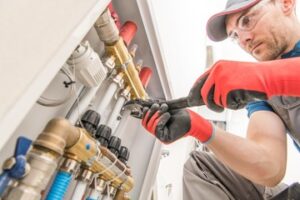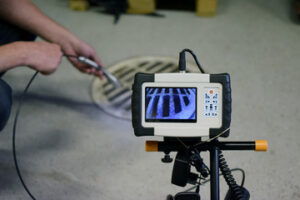Plumbing is the system of pipes and fixtures that convey water and other liquids to and from a building. It also includes waste and vent systems. It’s a complex network that meets two primary objectives: supplying clean, potable water and removing waste efficiently.

Sometimes, drains become clogged. This can be a major problem for homeowners and businesses alike. Fortunately, there are several ways to prevent this from happening. Visit https://www.plumbing-express.com/ to learn more.
Plumbing is a system of pipes and fixtures that transport water and other fluids. It is designed to meet two primary objectives: supplying clean, potable water and removing wastewater. The plumbing industry is highly regulated to ensure safe and efficient operations. It also provides job security and a steady source of income.
Plumbing pipes are usually made of copper, PVC, PEX, galvanized steel, or some combination of these materials. They carry pressurized, treated water into buildings from the municipal water supply and drain wastewater to the sewage system. The pipes also supply hot and cold water to appliances and fixtures such as sinks, toilets, bathtubs, showers, and faucets. The plumbing system also includes the venting and drainage systems, which connect to the pipes and direct waste to the sewers or septic tanks.
The drainage system is comprised of pipes that collect and transport grey water and effluent from fixtures and appliances to the septic tank or the storm water drain. This system prevents diseases and other health problems by ensuring that waste is not released into the environment.
Plumbers are skilled tradespeople who install, maintain, and repair pipes, fixtures, and other components of a plumbing system. They must have a wide range of skills to complete complex plumbing jobs, including reading blueprints, understanding engineering and construction principles, and working with a variety of tools. They must also be able to work with complicated machinery and understand the effects of different substances on pipes and fixtures.
The plumbing industry is constantly evolving, and new technologies are being introduced all the time. As a result, plumbers must continue to learn and upgrade their skills in order to stay competitive. This can be challenging, especially when it comes to working with hazardous materials and high-pressure systems. Additionally, plumbers often have to work evenings and weekends to address emergency situations. This can make it difficult to balance family life and career. However, the financial rewards can be significant. Most plumbers also have the option to become self-employed, which can provide greater flexibility and control over their schedules.
It is a career option.
There are a number of career options for plumbers, including those who work in residential or commercial settings. Most plumbers work for a plumbing service company, but some choose to open their own private business. This type of career path offers many benefits, including the ability to set your own hours and be your own boss. It also provides a steady income, which can be helpful for young families.
As a result, the demand for plumbers is high. This is especially true in new construction, where plumbing must be installed to meet building codes and standards. In addition, plumbing is often used in commercial settings such as restaurants and retail stores. This means that plumbers can find employment in a variety of locations, making it a versatile and rewarding career choice.
Plumbers can also work for government facilities, where they perform a wide range of tasks such as installing and repairing sewer lines. This specialized job can be very demanding, but it can also offer lucrative pay. In addition, plumbers can become certified as master plumbers, which increases their earning potential. Some plumbers also choose to leave the industry and move into other areas, such as sales or engineering.
In order to become a plumber, you will need to complete a vocational training program and acquire the necessary skills and certifications. These programs are usually offered by community colleges, trade schools, and professional plumbing associations. They typically take between 2 and 5 years to complete, and they provide students with both in-classroom instruction and on-the-job training supervised by experienced plumbers.
Those who have completed a vocational training program can also apply for a plumbing apprenticeship, which allows them to earn money while learning their trade. The apprenticeship will teach them how to use tools, understand basic plumbing principles, and pass a written exam. It will also help them develop a good working relationship with other plumbers, which is important for success in the field.
A plumbing career offers several benefits, including the fact that it is a safe and reliable profession. It is also highly respected and can lead to high wages and job security. In addition, it is cheaper and faster to train for a career in plumbing than to get a college degree.
It involves specialized training.
Plumbing is a highly practical career, and plumbers must have specialized training to be successful. This training can be completed through a trade school, vocational program, or an apprenticeship. It is important to find a program that offers hands-on experience, which will help you succeed in the field. You can also look for a program that offers supplemental online instruction, which will give you more flexibility to complete your education.
During the training process, you will learn how to install and maintain a variety of piping systems for residential, commercial, and industrial buildings. This includes examining pipes, calculating water flow, determining the layout of a system, and more. In addition, you will learn the basics of plumbing design, which is essential for working as a plumber.
In addition to the above, you will learn about the International Plumbing Code (IPC), which is a standard set of rules and regulations that all plumbers must follow. This will enable you to work safely and efficiently in the field, as well as prevent problems like water contamination or scalding.
Aspiring plumbers can start their career by enrolling in a vocational or technical program at a local community college or trade school. These programs typically combine classroom instruction with on-the-job training and can last up to a few years. The best choice for aspiring plumbers is a program that offers apprenticeship opportunities. These programs can be found through local unions and trade schools across New York.
Plumbing requires a high level of technical knowledge and an excellent work ethic. In addition, plumbers must be comfortable with technology and have a good understanding of mathematics. They are also required to work at night and on the weekends, so this may not be an ideal profession for those with family responsibilities.
WMCI’s introductory plumbing class is a great way to get started in the field and gain the skills you need to launch a career in plumbing. Upon completion, you’ll receive your certificate of completion and earn professional development hours toward your New York professional engineer license. Register early for classes, as many fill up quickly.
It requires a license.
A plumbing license is required to perform plumbing work in most states and cities. Depending on the state, the licensing process may take four or five years of work experience, education, and testing. Applicants must also meet local and city requirements for a license, including a background check, criminal record checks, and drug tests. Plumbers should also have customer service skills and be physically fit for the job.
Many plumbers earn their license by attending a trade school or entering a trade union apprenticeship program. These programs last four or five years and offer paid on-the-job training as well as classroom instruction. To be accepted into a program, a high school diploma or GED certificate is generally required. The apprentice typically works under the supervision of a licensed master plumber while learning the skills of the trade.
After completing an apprenticeship, plumbers can become journeymen or master plumbers. Journeymen must have a minimum of 10 years of on-the-job experience, and master plumbers must have at least 15 years of experience. To obtain a master plumber’s license, a candidate must pass a rigorous exam and complete a background check. The exam requires knowledge of local codes, blueprint reading, and safety regulations. In addition to the specialized knowledge, plumbers must have the ability to solve problems quickly and accurately.
Plumbing is a complex and vital part of the modern world. Its role is to provide safe, clean water and remove waste for human consumption. However, the plumbing industry is not without risks, including cross-connections, scalding, and thermal shock. A well-designed plumbing system reduces these risks and provides a high quality of life for the people who use it.
The majority of plumbers are union members, and they enjoy a number of benefits, such as health insurance, dental and vision coverage, and pension plans. In addition, union plumbers are able to command higher salaries than non-union employees. While most plumbers begin their careers with a high school degree or GED, some pursue college degrees and attend trade schools. These programs are not mandatory, but they can help a plumber advance in the field of plumbing and earn more money. Some plumbers even earn professional certifications, which can make them more attractive to employers and customers.
